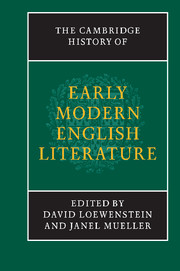Book contents
- Frontmatter
- Introduction
- 1 Modes and means of literary production, circulation and reception
- 2 The Tudor era from the Reformation to Elizabeth I
- 3 The era of Elizabeth and James VI
- 4 The earlier Stuart era
- 15 Literature and national identity
- 16 Literature and the court
- 17 Literature and the church
- 18 Literature and London
- 19 Literature and the theatre to 1660
- 20 Literature and the household
- 5 The Civil War and Commonwealth era
- Chronological outline of historical events and texts in Britain, 1528–1674, with list of selected manuscripts
- Select bibliography (primary and secondary sources)
- Index
- References
18 - Literature and London
from 4 - The earlier Stuart era
Published online by Cambridge University Press: 28 March 2008
- Frontmatter
- Introduction
- 1 Modes and means of literary production, circulation and reception
- 2 The Tudor era from the Reformation to Elizabeth I
- 3 The era of Elizabeth and James VI
- 4 The earlier Stuart era
- 15 Literature and national identity
- 16 Literature and the court
- 17 Literature and the church
- 18 Literature and London
- 19 Literature and the theatre to 1660
- 20 Literature and the household
- 5 The Civil War and Commonwealth era
- Chronological outline of historical events and texts in Britain, 1528–1674, with list of selected manuscripts
- Select bibliography (primary and secondary sources)
- Index
- References
Summary
This chapter aims to describe the complexities which characterise the relationship between the literary arts, especially those of an officially sanctioned kind, and political circumstances in the metropolis during the period 1603–40. At one level, this is a narrative of continuities. The principal forms in which the city of London constructed and celebrated its own image remained the same as in the Elizabethan period. Royal processions once more expressed the aspirations and the loyalism of the City towards the monarchy. Although there are significant silences, such as the cancelled celebration of the coronation of Charles I and the curtailed rites for the funeral of the Duke of Buckingham, the return of Charles I in 1641 from the Scottish crisis was commemorated as emphatically as the coronation entry of James I. The procession to commemorate the installation each year of a new Lord Mayor, a ritual established in its fullest form towards the end of the Elizabethan period, continued, arguably with increasing pomp, throughout our period. Paul’s Cross remained the most public and the most influential preaching platform in the City, and its careful control ensured a continuing loyalism in the majority of sermons preached there, many of which were subsequently printed.
Likewise, outside the arenas of state control, the self-representation of the metropolis appeared remarkably stable. City comedy, apparently holding up a mirror to the lives of London’s citizens, continued to be an extremely popular dramatic form, and its assumptions and values changed only a little between the late Elizabethan paradigms, such as The Shoemakers Holiday (1599), and early Stuart examples within that tradition.
- Type
- Chapter
- Information
- The Cambridge History of Early Modern English Literature , pp. 544 - 564Publisher: Cambridge University PressPrint publication year: 2003

